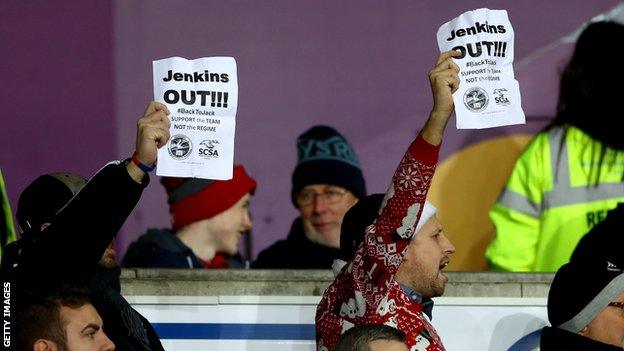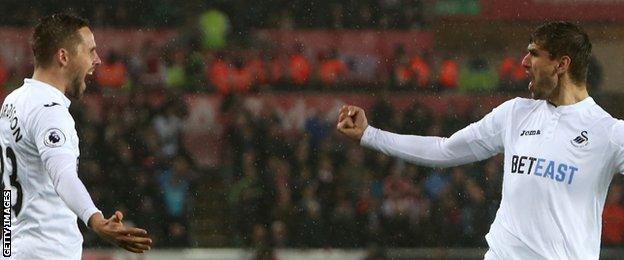Huw Jenkins: Ex-Swans chairman hopes they unite and thrive
- Published

Huw Jenkins (front centre) remained Swansea chairman after the takeover of the club by Stephen Kaplan (back left) and Jason Levien (back centre)
Huw Jenkins hopes his decision to stand down as chairman will see a united Swansea City move forward under manager Graham Potter.
Jenkins feels Swansea's American owners and the club's Supporters' Trust must come together to focus on rebuilding after relegation from the Premier League.
He argues Swansea have not yet seen the best of Steve Kaplan and Jason Levien since they bought a controlling stake in the club in 2016.
Jenkins admits he is "not 100% happy" with the way Swansea have operated in recent times and feels running the club has been a "headache" thus far for Kaplan and Levien.
In the wake of his resignation, Jenkins spoke to BBC Sport Wales about the takeover as well as the exodus of players following Swansea's return to the Championship.
He has defended Swansea's transfer business during his 17-year stint as chairman, but acknowledged there have been some failures in recent times.
Jenkins says Swansea never recovered from the loss of three players in the summer of 2017, and revealed that he was against the decision to sack Michael Laudrup in 2014.
He also explains how he took a huge pay cut - and was prepared to work for nothing - after relegation from the top flight saw Swansea's income plummet.
"The biggest feeling I have now is that I want to see the club calm, stable and settled again," he said.
"I hope my decision (to resign) helps everybody else find a solution for the good of the club because that's the most important thing.
"The way the club is running is a way I am not 100% happy with. It's out of my control now and I have to accept that.
"The other side is the atmosphere around the club because we sold, because of relegation - all those things build up. Putting that together with the change in my role and how much I can influence things led to my decision.
"I would like to think that very quickly the differences that exist off the field can be put right and I hope that acts as the catalyst to bring the club more success."
Glorious spell
Swansea enjoyed a glorious spell during Jenkins' time as chairman, climbing from the bottom of the Football League to the top flight, where they stayed for seven years, and winning a first major trophy.
But Jenkins, along with the club's former board of directors, have faced criticism over the decision to sell to Kaplan and Levien.
Swansea's shareholders at the time - the Supporters' Trust aside - made millions from the takeover, but Jenkins has insisted individual financial gain was not the key to the deal.
"That wasn't the driving force," he said.
"There was a balance there of selling shares and making sure whoever came in took over full financial responsibility for the club because we felt that was important.
"At one point we went up to a £13 million overdraft and that scared a lot of the old shareholders; that the reality of dropping out of the Premier League would be difficult to cope with.
"We needed a shareholder or shareholders taking financial responsibility for the club. That's how we felt and everybody knew that."

The Supporters' Trust owns 21.1% of Swansea and have argued they were kept out of takeover negotiations.
When that was put to him, Jenkins said: "There was a view because of previous interest in the club from another American consortium that until there was a deal worth considering, there was no deal at all.
"Until there was a potential deal on the table there was nothing for the rest of the shareholders to consider. All we did was bring a deal to the table.
"There were four months then to finalise any deal between all shareholders.
"The deal was introduced, as has been widely reported, in March 2016. All shareholders were given the draft sale document within 48 hours of each other. That was the first document any shareholder had seen.
"Anything could have happened between those dates to include or not include the trust going forward."
Jenkins says he has continually urged the Supporters' Trust to maintain "a big shareholding" in Swansea and to make sure there is no dilution of shares.
And he hopes his exit will see the Supporters' Trust and Swansea's owners find some common ground.
"What Jason and Steve have done at DC United, with the new stadium and the rebranding and how that has grown, shows they have got the resources and knowhow to do what they need to do," Jenkins added.
"I think the difficulties from day one for them here - the ongoing feud with the Supporters' Trust - haven't helped.
"If those differences had been nipped in the bud it would have certainly helped the club. I don't know who's to blame for that.
"There were meetings to try to find a new shareholders' agreement between the trust and the club and also to solve the share issue. Those things have been going on for two years.
"The sooner that is put to bed, the better for everybody's sake.
"They (Kaplan and Levien) are very experienced, strong businessmen, but from day one there's no doubt Swansea City has been a headache for them.
"Have we seen the best of them? No, I would say. I think they have a lot to offer, but the current situation of upheaval has not helped."
After four successful years in the Premier League, Swansea's first relegation scare came in 2015-16, shortly before the change of ownership.
"The difficulty has been from the takeover onwards that it's been tough on the field," Jenkins said.

Gylfi Sigurdsson and Fernando Llorente were Swansea fans' favourites
Swansea avoided relegation in 2016-17 thanks to a late-season surge in form but, having sold Gylfi Sigurdsson, Fernando Llorente and Jack Cork that summer, they went down 12 months later.
"Losing Gylfi, Llorente and Jack was too much for us," Jenkins added.
"They were more than just players, they provided belief within the squad. They made a difference.
"We'd had players previously like [Wilfried] Bony and Michu who also made a difference.
"But when we lost those three in that summer, they were very difficult to replace."
The likes of Tammy Abraham, Roque Mesa, Renato Sanches and the returning Bony came into the club at that stage, but were among a number of signings in the last few seasons who struggled to impress.
Jenkins acknowledges that recruitment has been an issue in recent years, adding: "I will accept that. But behind every decision there's a reason.

Huw Jenkins was against the sacking of Michael Laudrup as manager
"The biggest strength over the years has been working with managers, going right back to Brian Flynn, Kenny Jackett, Roberto Martinez, Brendan Rodgers and Michael Laudrup.
"We brought in players who were pivotal to our success.
"A big turning point was losing Michael. We never really recovered from that.
"That was a shared decision, a really difficult decision. All our shareholders, and I'll emphasise all, were pushing to get rid of Michael Laudrup.
"That didn't sit comfortably with me, but it's something I went along with at the time."
Nevertheless, Jenkins says Laudrup's successor, Garry Monk, "surpassed all expectations" when he delivered Swansea's best Premier League finish in 2014-15.
"To me that was the best Swansea team we've ever had on the pitch, the team we had at Manchester United on the opening day of that season," he said.
£200m on Premier League transfers
Jenkins has previously admitted the decision to stick with Francesco Guidolin rather than reappointing Rodgers in 2016 is one he regrets.
But where transfers are concerned, he is happy with the work done during his period at the helm.
"I think I am right in saying we spent about £200m on transfers while we were in the Premier League and probably recouped about £250 million," he said.
"We have probably got another £20-30 million in players who are out on loan, then we have the current squad.
"The squad that played last Saturday was put together for £5 million, but in my view they must be valued at £60 million now, so there have been a lot of good things done in our recruitment."
The last two transfer windows have seen Swansea offload 19 senior players while just a handful have moved in the opposite direction.
"Premier League relegation means a 50% or 60% drop in income," Jenkins added.
"Given the contracts of Premier League players, a club like Swansea City is left with no alternative but to reduce the playing wage bill as quickly as you can.
"That's what's happened in the last two windows. Players need to leave to balance the books. There's no other explanation.
"The quicker you go through the pain of that, the quicker you can regroup and hopefully Graham can make the club successful again.
"I am confident the choice to bring Graham in was a good one.
"If he is given time and the fans support him as they have, I'm sure he will bring the club success."
As well as offloading numerous players, Swansea have trimmed expenditure off the field in a bid to cope with the price of relegation.
'Decisions not mine to take'
And Jenkins says he offered to work on a voluntary basis to reduce the club's outgoings.
"I had a 70% pay cut after relegation and for the last year, the majority of expenses working for the club I've paid myself," he said.
"I also made an offer in July last year to work for nothing if we made more cutbacks. I was prepared to put a team of staff together to try to get us back on an even keel as fast as we could.
"I felt things needed to be done instantly. I felt we could start at the top where the salaries are higher and work down, stripping the club back to the bone and running it in a similar way to what we used to do.
"That didn't happen because the decisions weren't mine to take."